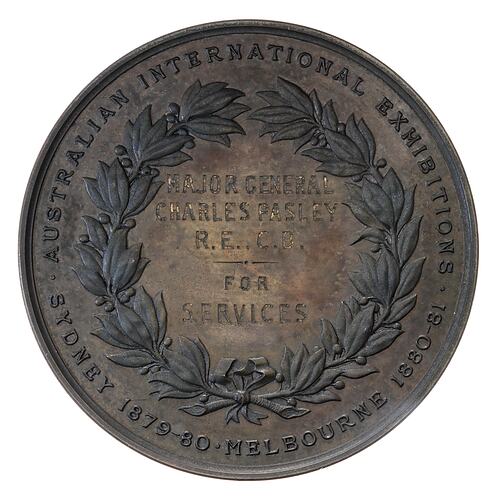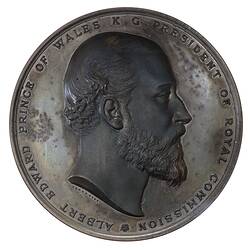Charles Pasley was born in 1824 in Chatham, England and was educated at King's Grammar Schoo, Rochester. At the age of 16 he became a pupil of the Royal Military Academy at Weelwich, and was commissioned in the Royal Engineers in December 1843. He served in Britain for three years, then in Canada and Bermuda, returning to England because of illness.
From 1851 Pasley served on the staff of the Great Exhibition, and in 1853, at the age of only 29, was appointed colonial engineer of Victoria. He arrived in Melbourne in September of that year and set to work improving his demoralised, under-staffed department. Barracks, court houses and offices were soon under construction. He became captain of the Royal Engineers on 17 February 1854, in time to offer assistance in the Eureka Stockade battle. He commanded skirmishes in the centre and restrained soldiers from taking reprisals after the battle.
From October 1854 to November 1855 Pasley was an official nominee in the Legislative Council. In November 1855 he was appointed commissioner of public works, thus undertaking both a political and professional role as head of his department. Major works started under his leadership included Pentridge gaol, Victoria Barracks and Parliament House, and later the Treasury and General Post Office. He favoured the use of local basalt or bluestone.
Pasley's other public roles included councillor of the Philosphical Institute, vice-president of the Melbourne Philharmonic Society and first patron of the Victorian Institute of Architects.
Pasley stood for the seat of South Bourke in the Legislative Assembly, qualifying due to his father's generosity - he bought the property necessary for Pasley to stand. Pasley won the seat, but lost his ministerial post in 1857. The following year he became vice-president of the royal commission on the colony's defences, which adopted his proposal for Melbourne to be defended by batteries at Hobson's Bay.
Late in 1859 a royal commission on the civil service recommended that the Public Works Department be headed by a non-professional. Pasley's time was up, and he rejoined his corps and resumed his military career. He leapt at the chance to served in New Zealand, where trouble was afoot, and soon found himself in Taranaki, employed as an engineer. He was wounded in an attach on a Maori fort and was invalided to Melbourne. He was also promoted to brevet major for his service. He finally set sail for England in 1861, at the age of 37.
In England Pasley was appointed commanding engineer at Garvesend. In 1864 he became special agent for Victoria, the same year he married his cousin Charlotte Roberts. They had no children. From 1865 Pasley was superintendent of the naval dockyard at Chatham, and managed a major extension over eight years. He then became director of works at the Admiralty.
In July 1879 Pasley was appointed a commissioner for the Melbourne International Exhibition, and in 1880-82 acted as Victoria's agent-general and chair of the Board of Advice in London. On his retirement from the army he was promoted to major-general. He died at his home in 1890, at the age of 66.
References:
Australian Dictionary of Biography website http://adbonline.anu.edu.au/adbonline.htm
More Information
-
Keywords
-
Localities
-
Authors
-
Article types

